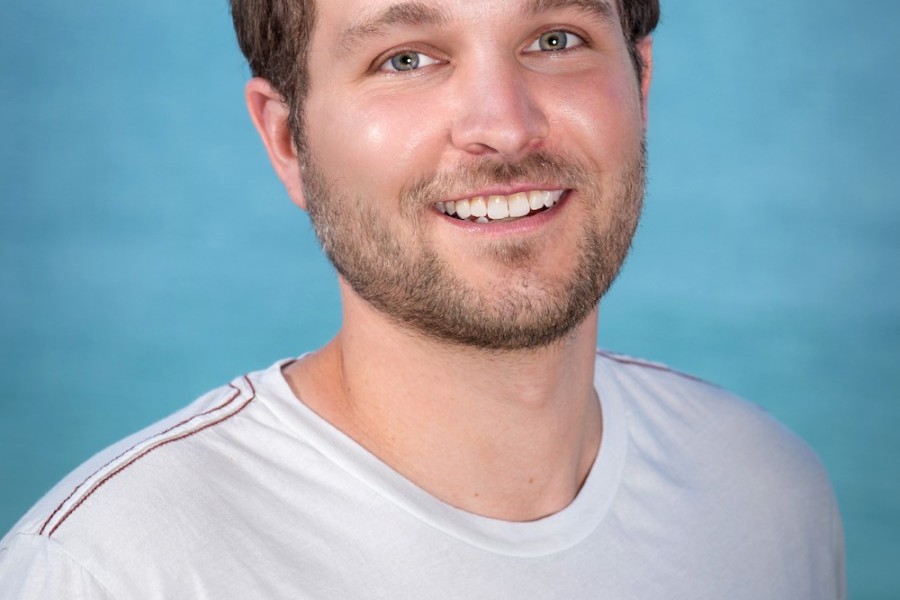Mote announces new manager of Ocean Technology Research Program
Mote Marine Laboratory is pleased to announce the promotion of Dr. Jordon Beckler to manager of Mote’s Ocean Technology Research Program.
The program develops and deploys technology at sea to gather data useful for multiple research programs at Mote and beyond. Data are collected and re-distributed through Mote’s Southern Operations – Coastal Ocean Observing Laboratory (SO-COOL) and the Gulf Coast Ocean Observing System (GCOOS). The program operates two robotic gliders, or autonomous underwater vehicles. These gliders, which resemble yellow torpedoes, move through the ocean and carry instruments that monitor several kinds of conditions, especially with the goal of studying phytoplankton such as Karenia brevis, the species of algae that causes Florida red tide.
Beckler became a Mote staff scientist in February 2015 after earning his doctorate in summer 2014 from Georgia Institute of Technology. There, he was part of projects to adapt widely-used lab instruments for their first deployment in the water, expanding scientists’ ability to monitor marine environments more accurately and efficiently. In particular, the Georgia Tech team helped adapt a common and important lab analytical instrument called a high-performance liquid chromatography (HPLC) to collect data autonomously in the water. Beckler plans to continue research at Mote along similar lines; some forms of lab-based HPLC are considered the gold standard for studying the pigments and toxins from harmful algae.
Mote’s Ocean Technology Research Program also oversees the scientific instruments that Mote has already developed, such as the optical phytoplankton discriminators that can detect K. brevis and several other microscopic algae species.
As program manager, Beckler will continue his research on ocean chemistry — particularly iron chemistry — to better understand the formation and behavior of Florida red tides. Florida red tides can form in offshore waters low in nutrients, specifically nitrogen, and these conditions might be expected to limit the growth of K. brevis algae. However, iron might indirectly release nutrients by stimulating another phytoplankton species called Trichodesmium, which can “fix” nitrogen from the atmosphere into a form useful for phytoplankton such as K. brevis. Where the iron might come from is still debated, and one source might be sediments carried from rivers to the sea. Beckler and colleagues found that rivers in Georgia could produce bioavailable iron (useful to algae) carried from rivers to the ocean, and he hopes to learn whether this process happens along Florida.
“This promotion essentially allows me to chart my own course — to pursue work that matters to me and to the world,” Beckler said. “For instance, the opportunity to study iron chemistry is a perfect way to apply my dissertation work to environmental systems that matter to Floridians. With so many emerging questions in the field of ocean technology, the research projects I undertake are limited only by my imagination and by my ability to find funding support. This kind of independence is the dream of most scientists.”
Beckler, an early-career Ph.D. scientist, is one of the rising stars of Mote’s next-generation research team. During his time at Mote so far, he has already played an instrumental role in studying and monitoring the Florida red tide blooms that started in September 2015, published a study on deep-ocean carbon chemistry with results that could help improve global climate modeling, and presented at several regional and national conferences.
“During his first year at Mote, Dr. Beckler has exceeded our expectations with his great record of scientific publications, presentations and outreach, along with his innovative take on longstanding scientific questions about Florida ecosystems,” said Dr. Michael P. Crosby, President & CEO of Mote. “He has combined his considerable strengths with those of his mentor at Mote, Dr. Kellie Dixon, setting an excellent example of the way young Ph.D. scientists can integrate, succeed and emerge as leaders here at Mote.”
Mote’s 2020 Vision & Strategic Plan emphasizes recruiting and nurturing the next generation of outstanding Ph.D. scientists. Read the plan at www.mote.org/about-us
With Beckler’s promotion to manager of the Ocean Technology Research Program, the program’s previous manager, Dr. Kellie Dixon, will return her full attention to her longstanding role as manager of Mote’s Chemical and Physical Ecology Program. Dixon will continue to mentor and collaborate with Beckler.
The Ocean Technology Research Program and other Mote programs share data through GCOOS – the Gulf of Mexico Coastal Ocean Observing System. GCOOS provides timely information about the environment of the U.S. portion of the Gulf of Mexico and its estuaries for use by decision-makers, including researchers, government managers, industry, the military, educators, emergency responders and the general public.
